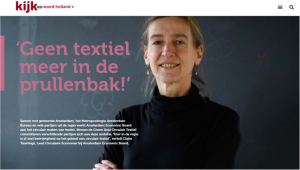‘Geen textiel meer in de prullenbak!’
Samen met gemeente Amsterdam, het Metropoolregio Amsterdam Bureau en vele partijen uit de regio werkt Amsterdam Economic Board aan het circulair maken van textiel. Binnen de Green Deal Circulair Textiel committeren verschillende partijen zich aan deze ambitie. “Hier in de regio is al veel bedrijvigheid op het gebied van circulair textiel”, vertelt Claire Teurlings, Lead Circulaire Economie bij Amsterdam Economic Board.
“De komende jaren moeten er veel meer activiteiten op het gebied van circulair textiel gaan plaatsvinden.” Eén van de acties om te komen tot die bedrijvigheid was de ondertekening – door vele partijen – van de Green Deal Circulair Textiel, afgelopen december. “We hebben daarmee twee specifieke doelen: we willen in 2030 50% van het textiel in een closed loop hebben: een afgesloten kringloop. En we willen al in 2025 30% gerecycled materiaal in nieuwe producten toepassen.” 30% van de materialen in bijvoorbeeld een trui of broek moeten dan of van gerecycled materiaal zijn, of van hernieuwbaar materiaal.
Het artikel is gepubliceerd in Kijk op Groot Amsterdam.
Innovatieve koplopers
“We hebben in de regio veel bruikbaar afgedankt textiel én we hebben bedrijven die daar wat mee kunnen, zoals textielsorteerder Wieland in Zaanstad en Brightloops in Amsterdam, dat nieuwe kleding maakt van niet herdraagbaar textiel.” Teurlings noemt deze twee omdat zij al jarenlang samenwerken. “Zij zijn voorbeelden van de belangrijke samenwerkingen om de textielkringloop te kunnen sluiten.” Bij Wieland komen grote hoeveelheden textiel binnen die voor een deel nog draagbaar zijn, maar voor een groot deel niet. “Juist voor dit textiel heeft Wieland een slimme sorteermachine: Fibersort.” Innovatieve koplopers zoals deze trekken een cluster van andere bedrijvigheid aan, waardoor kennis, ervaring en technologie zich bundelt rondom Zaandam.”
Rendabele samenwerking
Maar koplopers zijn niet op bestelling leverbaar. “De crux zit hem in de businesscase. Het is nog moeilijk zo’n proces op grote schaal rendabel te maken. We hebben kleine én grote spelers nodig.” Grote modemerken kun je niet eenvoudigweg vragen hun bedrijfsproces om te gooien. “We zetten wel stappen in de goede richting.” Teurlings noemt kleinere spelers die kleding van herbruikbaar textiel aan de man brengen, zodat van deze kleding – die soms nauwelijks gedragen is – ook nieuwe items gemaakt kunnen worden. Of merken die hun kleding duurzamer maken, zodat deze een langere levensduur heeft. “Het is niet aan ons om oplossingen uit te kristalliseren, onze rol is om experts bij elkaar te brengen en te identificeren: wat zijn knelpunten, wat zijn potentiële drijvende krachten en welke partijen kunnen met oplossingen komen? Wij zorgen ervoor dat de samenwerking op gang komt.”
Herbruikbare beschermende kleding
Een ander voorbeeld is het ontwikkelen van herbruikbare beschermende kleding voor de zorg. “Zorginstellingen in de regio hadden een tekort aan beschermende kleding. Wij kijken samen met die instellingen en de markt hoe we ervoor kunnen zorgen dat er niet allerlei wegwerpartikelen worden aangeschaft, maar hoe we komen tot herbruikbaar textiel. Zo kunnen we tekorten voorkomen, hebben zorginstellingen zelf hun voorraad in de hand en dragen we bij aan regionale activiteit. Bovendien voorkomen we dan dat er continue wegwerpartikelen in de verbrandingsoven verdwijnen.”
Niet weggooien, maar repareren
Onderdeel van de Green Deal is ook het Reparatie Shared Service Centrum, ontstaan vanuit de behoefte van modemerken om hun klanten reparaties aan te bieden. “Zij hebben die expertise niet, wij kennen partijen die dat wel hebben. Ook is er vanuit gemeenten behoefte om mensen aan werk te helpen én hebben de textiel- en modeopleidingen behoefte aan praktijkplekken. We brengen al die verschillende taartpunten bij elkaar. We beginnen op kleine schaal, maar willen op termijn op grotere schaal opereren. Over vijf jaar moet er gewoon niks meer in de prullenbak belanden!”
Green Deal Circulair Textiel
In december ondertekenden vele partijen uit de regio de Green Deal Circulair Textiel. De gezamenlijke intentie is om de komende drie jaar te werken aan een circulaire aanpak van textiel: refuse, reduce, reuse, repair, repurpose of recycling en regionale verwerking.
Initiatieven
- Reparatie Shared Service Centrum
- Circular Fashion Innovation Lab
- Integreren van circulaire principes in textielonderzoek en -onderwijs
- Circulaire inkoop van werkkleding, waaronder beschermende kleding voor de zorg
- Bewustwordingscampagne voor eindgebruikers
Aansluiten?
Wil je ook aansluiten bij het initiatief van de Board? Klik hier voor meer informatie en neem contact op met Claire Teurlings.
4 maart 2021
Meer weten over
Neem contact op
Blijf jij ook op de hoogte?
8x per jaar nieuws en events uit de regio: schrijf je in voor de Board Update nieuwsbrief
Deel dit artikel
Wil je op de hoogte blijven?
Volg ons dagelijks op LinkedIn en schrijf je in voor de Board Update nieuwsbrief.
Lees ook deze berichten
- Een nieuwe lichting gedreven jongeren is aangetreden bij Young on Board, de ...
- Met de selectie van vier kanshebbers is de regionale voorronde van de ...
- Met meer dan 80 ondernemers, 40 investeerders en diverse dienstverleners bood LSH Capital Match ...


